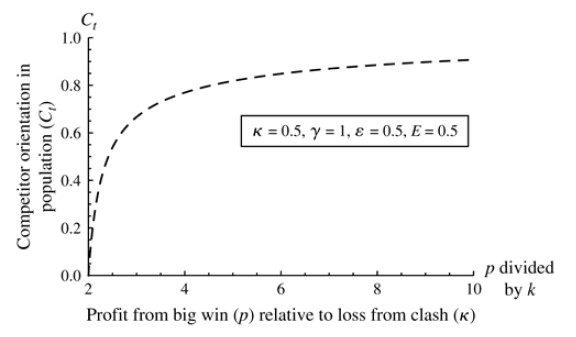My first major article was on Competitor Orientation And The Evolution of Business Markets. I think it is a fun one. Even though it took years and years to publish. Some may have agreed. it was fun That said, it is a bit mathy at times.
Aiming To, Is Not Maximizing Profits
When people envisage competitive markets they usually assume that only those who are aiming to maximize profits will survive. This evolutionary argument is an interesting one, see here. The main problem I’d identify is that this presumes that all markets are the same. Different ecosystems see different animals thriving. As such, it would be surprising to me if exactly the same behavior thrived in every market.
Mark Vandenbosch, an Ivey colleague [in 2014], and I considered business markets. In such markets reputations typically matter. This makes a huge difference. They are not at all like the anonymous markets that dominate financial market theory. When reputations matter strategic considerations become more interesting. If I can develop a reputation for aggressiveness now I might gain in future interactions. This is because partners may make concessions. Aggression now might gain concessions later. It could stop future potentially destructive battles. (But it can also cause them now). Life is complex. That is point really.
Classic Games
We considered two main types of markets based upon classic game theory scenarios. Chicken represents battles over scarce resources. For instance, two firms consider a market entry. If only one enters that firm will be very profitable. Yet, if both enter the market competition will doom both to a loss. The Battle of Sexes represents scenarios where managers are negotiating over the surplus created by a deal. This describes channel partnerships. All want to work together. Still, each manager wants the other to agree to favourable terms. (It is a bit of a bleak view of relationships. The classic illustration is a married couple on date night. You have to go to opera or boxing. Both seem highly stereotypical. It is like that. Plus, I would hate going to either).
In both of the markets we examined whether competitor orientation could survive. Competitor orientation is the desire for relative, not absolute, success. Competitor-oriented managers can prefer less profit over more profit. They do this as long as another manager gets less profit. Winning is more important than doing well by objective criteria. To be clear this is a decision-making error by conventional thinking. (Plus these people are terrible people).
Selection On Profits
Selection in the markets we studied was based solely upon profits. As such, one might think that those who survived would be those who aimed to maximize profits. This was not the case. The competitor-oriented could perform very well. They did this by scaring off their more profit-focused rivals. The threat of fighting worked for those who needed to win. They could credibly commit to aggressive action. This meant they often collected big prizes abandoned by profit maximizers who wouldn’t risk fighting for them.
Big problems arose when the population consisted of too many of the competitor-oriented. They hurt each in fights. Lots of pointless fights. These were caused by their excess aggressiveness. The population, therefore, stabilized before the competitor-oriented took over the population. The point, aggressiveness worked, but only so far.
What the population stabilized at depended on the market. Different characteristics gave different levels. Yet, those looking solely at profits were often a minority.
Competitor Orientation And The Evolution of Business Markets
Our conclusion:
Selection on profitability will often not weed out the competitor-oriented.
Bendle and Vandenbosch 2014, page 793
The evolution of markets is more interesting than intuition based upon profit maximization might suggest. Don’t think aiming for profits means getting profits. Markets are complex. We have much to learn. In summary, don’t assume that business is just about aiming for profits. (Even were that for the best).
For more on strategy and evolutionary thinking see here.
Read: Neil Bendle and Mark Vandenbosch (2014), Competitor Orientation and the Evolution of Business Markets, Marketing Science, 33 (6) November-December, page 781-795

